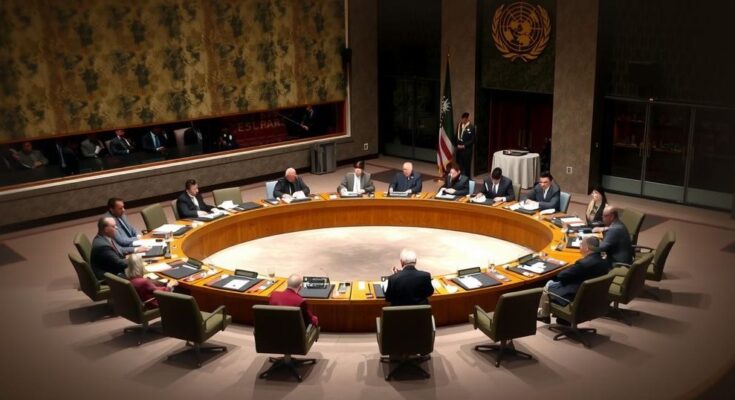On January 1, 2025, Pakistan began a two-year term in the UN Security Council, raising concerns over its historical support for terrorism. Pakistani authorities claim a dedication to combatting global security challenges, yet skepticism persists due to past actions. India’s relationship with Pakistan may become increasingly tense as Pakistan may use its new role to promote its agenda, particularly concerning Kashmir, while the global community must monitor its actions closely.
On January 1, 2025, Pakistan commenced its two-year tenure as a temporary member of the United Nations Security Council (UNSC), marking the nation’s eighth election to this crucial 15-member body. Presented as an opportunity to actively participate in addressing pressing global issues, this accession has ignited significant apprehensions, particularly from India, surrounding Pakistan’s historical utilization of terrorism as an instrument of statecraft and the potential implications for regional stability. Notably, Pakistani diplomat Munir Akram’s assertions of seeking ‘active and constructive solutions’ to combat terrorism can be perceived as contradictory, given Pakistan’s longstanding support for terrorist factions that operate beyond its borders, particularly in India and Afghanistan.
While the UNSC asserts authority over international peace and security matters, Pakistan’s position as a non-permanent member from January 1, 2025, to December 31, 2026, entails both responsibilities and limitations. Although lacking veto power, Pakistan will have the ability to engage in resolutions and dialogues, indicating that its role could significantly influence discussions within the UNSC context. Given the intricate geopolitical landscape, especially with Pakistan’s pervasive promotion of the Kashmir issue, its conduct may provoke skepticism regarding its intentions and alignment with the global anti-terrorism narrative.
India, witnessing the developments closely, perceives potential threats arising from Pakistan’s membership, especially related to the Kashmir conflict. Historical precedence indicates that Pakistan habitually raises the Kashmir issue on international platforms; hence, its UNSC seat could potentially empower its agenda. Furthermore, by participating in committees dedicated to counter-terrorism sanctions, Pakistan may paradoxically undermine actual anti-terror measures or protect entities aligned with its regime.
As Pakistan embarks on this critical juncture within the UNSC, there lies an onus on the global community, notably India, to monitor Pakistan’s actions closely. The capacity for Pakistan to exhibit genuine commitment to eradicating terrorism remains questionable, contingent upon whether its diplomatic rhetoric coincides with verifiable actions. The effectiveness of Pakistan’s tenure in the UNSC may serve as an intriguing barometer of regional and international security dynamics.
Pakistan’s reelection to the United Nations Security Council as a temporary member in 2025 unfolds against a complex backdrop of historical grievances, international relations, and contentious dynamics involving its neighbor, India. The UNSC primarily works to maintain global peace and security, comprising five permanent members and ten non-permanent members whose roles are critical but do not include veto powers. However, Pakistan’s previous track record of allegedly utilizing terrorism to achieve foreign policy objectives complicates its capacity to engage credibly in discussions on combating terrorism and international security. Historically, Pakistan has faced accusations of supporting militant groups operating in Jammu and Kashmir, as well as other regions, thereby casting doubts over its claims of being an advocate against terrorism.
In summary, while Pakistan’s appointment to the UNSC presents an opportunity for the nation to contribute to global security discussions, suspicions regarding its leveraging of terrorism as a tool of policy remain prevalent. The international community must stay vigilant and assess whether Pakistan’s actions during its term are congruent with its professed objectives, particularly concerning genuine anti-terrorism efforts and the broader implications for regional stability.
Original Source: www.financialexpress.com




